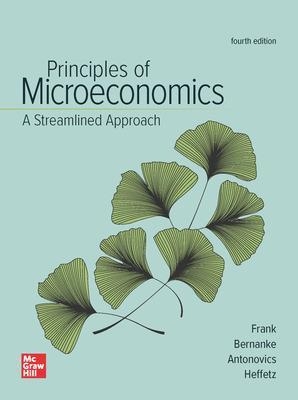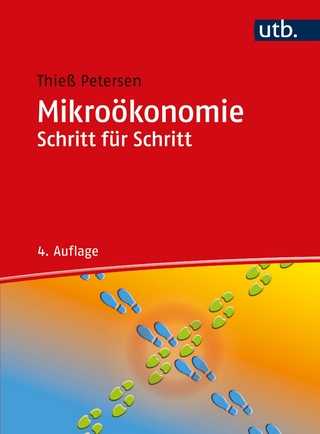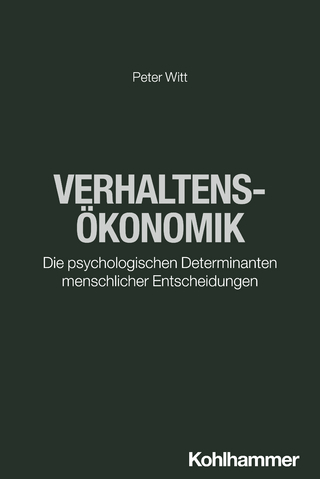
Principles of Microeconomics, A Streamlined Approach
McGraw-Hill Education (Verlag)
978-1-264-05878-5 (ISBN)
Fewer themes, less math rigor, and a new suite of video resources allow instructors the flexibility to teach the course they want to teach, whether it’s adopting a flipped classroom format, administering a course online, or just bringing more engaging, digital content into their lectures. Students benefit from more repetition of basic concepts and support through the interactive resources in Connect, resulting in a greater mastery and retention of core economic ideas.
With new videos and engagement tools in Connect, like Application-Based Activities, alongside SmartBook's adaptive reading experience, the 4th edition enables instructors to spend class time engaging, facilitating, and answering questions instead of lecturing on the basics. Connect is the only integrated learning system that empowers students by continuously adapting to deliver precisely what they need, when they need it, and how they need it, so that your class time is more engaging and effective.
Robert H. Frank received his M.A. in statistics from the University of California at Berkeley in 1971, and his Ph.D. in economics in 1972, also from U.C. Berkeley. He is the Goldwin Smith Professor of Economics at Cornell University, where he has taught since 1972 and where he currently holds a joint appointment in the department of economics and the Johnson Graduate School of Management. He has published on a variety of subjects, including price and wage discrimination, public utility pricing, the measurement of unemployment spell lengths, and the distributional consequences of direct foreign investment. For the past several years, his research has focused on rivalry and cooperation in economic and social behaviour. Professor Bernanke received his B.A. in economics from Harvard University in 1975 and his Ph.D. in economics from MIT in 1979. He taught at the Stanford Graduate School of Business from 1979 to 1985 and moved to Princeton University in 1985, where he was named the Howard Harrison and Gabrielle Snyder Beck Professor of Economics and Public Affairs and where he served as chair of the Economics Department. Professor Bernanke is currently a Distinguished Fellow in Residence with the Economic Studies Program at the Brookings Institution. Professor Bernanke was sworn in on February 1, 2006, as chair and a member of the Board of Governors of the Federal Reserve System; his second term expired January 31, 2014. Professor Bernanke also served as chair of the Federal Open Market Committee, the Feds principal monetary policymaking body. Professor Bernanke was also chair of the Presidents Council of Economic Advisers from June 2005 to January 2006.Professor Bernankes intermediate textbook, with Andrew Abel and Dean Croushore, Macroeconomics, Ninth Edition (Addison-Wesley, 2017), is a best seller in its field. He has authored numerous scholarly publications in macroeconomics, macroeconomic history, and finance. He has done significant research on the causes of the Great Depression, the role of financial markets and institutions in the business cycle, and measurement of the effects of monetary policy on the economy. Professor Bernanke has held a Guggenheim Fellowship and a Sloan Fellowship, and he is a Fellow of the Econometric Society and of the American Academy of Arts and Sciences. He served as the director of the Monetary Economics Program of the National Bureau of Economic Research (NBER) and as a member of the NBERs Business Cycle Dating Committee. From 2001 to 2004 he served as editor of the American Economic Review, and as president of the American Economic Association in 2019. Professor Bernankes work with civic and professional groups includes having served two terms as a member of the Montgomery Township (New Jersey) Board of Education. Professor Antonovics received her B.A. from Brown University in 1993 and her Ph.D. in economics from the University of Wisconsin in 2000. Shortly thereafter, she joined the faculty in the Economics Department at the University of California, San Diego, where she has been ever since. Professor Antonovics is known for her superb teaching and her innovative use of technology in the classroom. Her highly popular introductory-level microeconomics course regularly enrolls over 450 students each fall. She also teaches labor economics at both the undergraduate and graduate level. In 2012, she received the UCSD Department of Economics award for best undergraduate teaching. Professor Antonovicss research has focused on racial discrimination, gender discrimination, affirmative action, intergenerational income mobility, learning, and wage dynamics. Her papers have appeared in the American Economic Review, the Review of Economics and Statistics, the Journal of Labor Economics, and the Journal of Human Resources. She is a member of both the American Economic Association and the Society of Labor Economists. Professor Heffetz received his B.A. in physics and philosophy from Tel Aviv University in 1999 and his Ph.D. in economics from Princeton University in 2005. He is an Associate Professor of Economics at the Samuel Curtis Johnson Graduate School of Management at Cornell University, where he has taught since 2005. Bringing the real world into the classroom, Professor Heffetz has created a unique macroeconomics course that introduces basic concepts and tools from economic theory and applies them to current news and global events. His popular classes are taken by hundreds of students every year, on the Cornell Ithaca campus and, via live videoconferencing, in dozens of cities across the U.S., Canada, and beyond. Professor Heffetzs research studies the social and cultural aspects of economic behavior, focusing on the mechanisms that drive consumers choices and on the links between economic choices, individual well-being, and policymaking. He has published scholarly work on household consumption patterns, individual economic decision making, and survey methodology and measurement. He was a visiting researcher at the Bank of Israel during 2011, is currently a Faculty Research Fellow at the National Bureau of Economic Research (NBER), and serves on the editorial board of Social Choice and Welfare.
PART 1 Introduction
1 Thinking Like an Economist
2 Supply and Demand
PART 2 Competition and the Invisible Hand
3 Demand and Elasticity
4 Perfectly Competitive Supply
5 Efficiency, Exchange, and the Invisible Hand in Action
PART 3 Market Imperfections
6 Monopoly, Oligopoly, and Monopolistic Competition
7 Games and Strategic Behavior
8 An Introduction to Behavioral Economics
9 Externalities and Property Rights
PART 4 Economics of Public Policy
10 Using Economics to Make Better Policy Choices
PART 5 International Trade
11 International Trade and Trade Policy
| Erscheinungsdatum | 23.04.2021 |
|---|---|
| Verlagsort | OH |
| Sprache | englisch |
| Maße | 224 x 285 mm |
| Gewicht | 873 g |
| Themenwelt | Wirtschaft ► Volkswirtschaftslehre ► Mikroökonomie |
| ISBN-10 | 1-264-05878-0 / 1264058780 |
| ISBN-13 | 978-1-264-05878-5 / 9781264058785 |
| Zustand | Neuware |
| Haben Sie eine Frage zum Produkt? |
aus dem Bereich


